
by Shaun Chamberlin | May 29, 2015 | All Posts, Climate Change, Cultural stories, Economics, Out and about, Politics, TEQs (Tradable Energy Quotas), Transition Movement
Lately we've seen the president of the World Bank and 'business leaders from the very carbon-intensive industries' pushing for carbon pricing (taxes or 'carbon trading' schemes). This is intended to demonstrate their deep change of heart and determination to start seriously addressing climate change, but to my eyes it is a deeply cynical, pernicious attempt to channel the passion of those deeply-committed to action on climate change into mechanisms that will only maintain the suicidal status quo.
Which is why I poured all my experience of ten years' work on the topic into this peer-reviewed academic paper, which I believe demolishes the case for carbon taxes or carbon trading schemes as the way forward, and shows a clear, well-researched alternative (though it took almost as much effort as writing my book!).
The paper, co-authored with Drs. Larch Maxey and Victoria Hurth, focuses on the TEQs scheme devised by the late David Fleming, the radical economist whose work was a core inspiration for the Transition Towns movement. Since meeting David in 2006 I have been rather inspired by his design for a policy framework for a society that really wanted to decarbonise. We may not live in that society yet, but it's nonetheless a rather important tool to have in the box.
Over the years that inspiration has led me to write and speak widely on TEQs (to audiences ranging from community groups, Climate Camps and Occupations to the UK Committee on Climate Change, the London School of Economics, the UK and Scottish Parliaments and the European Commission), as well as advising the UK government on their feasibility study into the scheme.
After David Fleming's sudden death in 2010, it fell to me to keep the fruits of his genius on the table, and so I created The Fleming Policy Centre to continue advocacy in light of the extensive media interest the scheme was attracting.
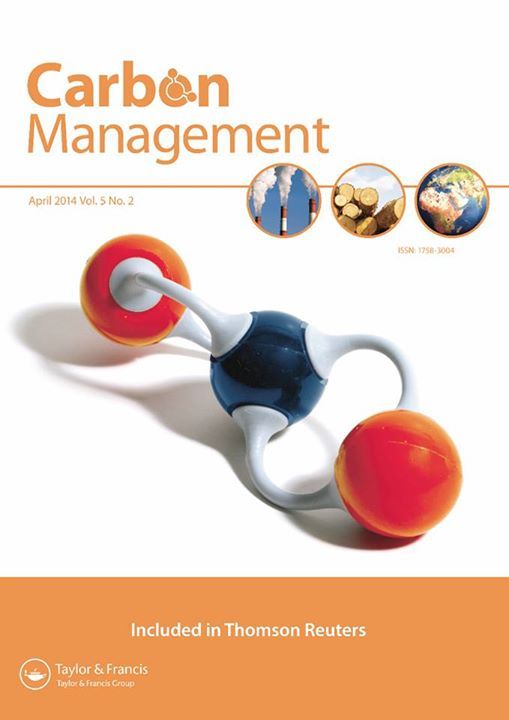 This new piece in the Carbon Management journal has emerged from all of that as the definitive paper on TEQs, covering its design, history and importance, and directly contrasting its hard cap on emissions with the ‘carbon pricing’ approach that has undermined public engagement with, and support for, climate policy.
I have written before about the shortcomings of global-scale action on global-scale problems, but local-scale action has its inherent problems too. Without a supportive economic/political framework in place, it is always swimming against the tide, and this can be exhausting and disheartening. As explained in the paper, TEQs provides the key framework to join up local and global scale efforts into an effective solution, making it clear to everyone - across all sectors - how to act on our intrinsic shared desires to sustain affordable access to energy and preserve a benign climate (see section on "Integration – cross-sector engagement, motivation and collaboration", pp. 8-10).
Not to mention leading to support and investment for human-scale, community-level initiatives and enterprises and local economies, making for more integrated, happier, resilient communities and a stronger sense of common purpose across society. I really believe that TEQs could catalyse a turning point towards a happier world and, more importantly, the extensive research done to date backs that up. Also, as discussed in the paper, unlike many other beautiful ideas, it actually has a hope of being implemented!
Rather than seeing our most committed people channelled into building inherently flawed 'carbon pricing' mechanisms, let's focus our energies on something genuinely radical that creates a fairer, more equitable world, and which enjoys greater public support.
I look forward to hearing what you make of our work, in the comments below or elsewhere.
~ UPDATE - This was my first venture into scientific academic writing (and likely last, after such an arduous process!), but I strove to ensure that academic-speak was kept to a minimum, and that the message is clear.
So it is gratifying to see that only a month after publication it is already in the Top 10 most-read pieces that have been published in the Carbon Management journal and, according to Altmetric, in the top 5% most discussed articles among the 4 million or so that they track! That said, it will have to have one hell of an impact to tempt me into academia ever again ;) ~
~ SECOND UPDATE - 23rd Sept 2015 - Tom Burke has published an exceptional blog post giving far more insight into the devious motivations of Big Oil in promoting carbon pricing.
And in the meantime, our paper has become the most read in the history of the Carbon Management journal, and in the top 3% most discussed on Altmetric. Despite Big Oil's best efforts, word's getting out... ~
In the meantime, I have been 'offsetting' the pain of academic writing by indulging in some deeply nourishing artivist agnosticism with Reverend Billy and his glorious Stop Shopping Choir (spot me flyering around the 1m30 mark).
A little analysis and deep thinking is important - after all “action for action's sake is the last resort of mentally and morally exhausted men” - but too much makes Jack a dull boy... I must confess, I'm rather tempted to run away and join the church. My mother would be truly horrified!
I'll have to content myself with heading to the Reclaim The Power direct action camp this weekend :) See you there?
This new piece in the Carbon Management journal has emerged from all of that as the definitive paper on TEQs, covering its design, history and importance, and directly contrasting its hard cap on emissions with the ‘carbon pricing’ approach that has undermined public engagement with, and support for, climate policy.
I have written before about the shortcomings of global-scale action on global-scale problems, but local-scale action has its inherent problems too. Without a supportive economic/political framework in place, it is always swimming against the tide, and this can be exhausting and disheartening. As explained in the paper, TEQs provides the key framework to join up local and global scale efforts into an effective solution, making it clear to everyone - across all sectors - how to act on our intrinsic shared desires to sustain affordable access to energy and preserve a benign climate (see section on "Integration – cross-sector engagement, motivation and collaboration", pp. 8-10).
Not to mention leading to support and investment for human-scale, community-level initiatives and enterprises and local economies, making for more integrated, happier, resilient communities and a stronger sense of common purpose across society. I really believe that TEQs could catalyse a turning point towards a happier world and, more importantly, the extensive research done to date backs that up. Also, as discussed in the paper, unlike many other beautiful ideas, it actually has a hope of being implemented!
Rather than seeing our most committed people channelled into building inherently flawed 'carbon pricing' mechanisms, let's focus our energies on something genuinely radical that creates a fairer, more equitable world, and which enjoys greater public support.
I look forward to hearing what you make of our work, in the comments below or elsewhere.
~ UPDATE - This was my first venture into scientific academic writing (and likely last, after such an arduous process!), but I strove to ensure that academic-speak was kept to a minimum, and that the message is clear.
So it is gratifying to see that only a month after publication it is already in the Top 10 most-read pieces that have been published in the Carbon Management journal and, according to Altmetric, in the top 5% most discussed articles among the 4 million or so that they track! That said, it will have to have one hell of an impact to tempt me into academia ever again ;) ~
~ SECOND UPDATE - 23rd Sept 2015 - Tom Burke has published an exceptional blog post giving far more insight into the devious motivations of Big Oil in promoting carbon pricing.
And in the meantime, our paper has become the most read in the history of the Carbon Management journal, and in the top 3% most discussed on Altmetric. Despite Big Oil's best efforts, word's getting out... ~
In the meantime, I have been 'offsetting' the pain of academic writing by indulging in some deeply nourishing artivist agnosticism with Reverend Billy and his glorious Stop Shopping Choir (spot me flyering around the 1m30 mark).
A little analysis and deep thinking is important - after all “action for action's sake is the last resort of mentally and morally exhausted men” - but too much makes Jack a dull boy... I must confess, I'm rather tempted to run away and join the church. My mother would be truly horrified!
I'll have to content myself with heading to the Reclaim The Power direct action camp this weekend :) See you there?
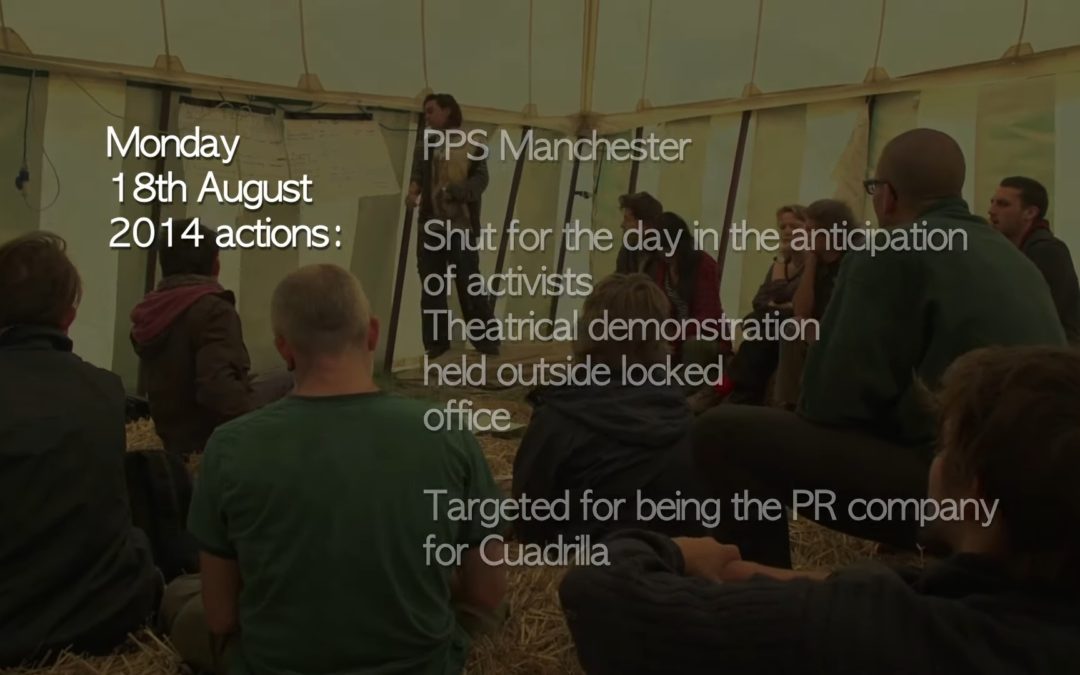
by Shaun Chamberlin | Sep 1, 2014 | All Posts, Climate Change, Cultural stories, Out and about, Politics, TEQs (Tradable Energy Quotas), The right to land, Transition Movement
A couple of nice videos from my wanderings in August. I started with a few days at the ever-wonderful Transition Heathrow, to support them through their threatened eviction. You can see how that went in the short video above.
And then a coach was arranged from Grow Heathrow up to the Reclaim The Power anti-fracking camp in Blackpool, where I gave a couple of workshops, on TEQs and the Grow Heathrow eviction resistance, as well as doing my first Legal Observer training. The video below tells the story of that camp, and I certainly learned a lot there, as well as having a great time.
It reminded me in many ways of the Climate Camps - it's amazing what a group of committed people can build and achieve when nobody's telling them what to do...
Oh, and those with keen eyes might spot me in both vids! :)
Now time for an overdue month of reading, writing and generally catching up with myself before October's adventures in Scotland with Findhorn and Trees for Life.
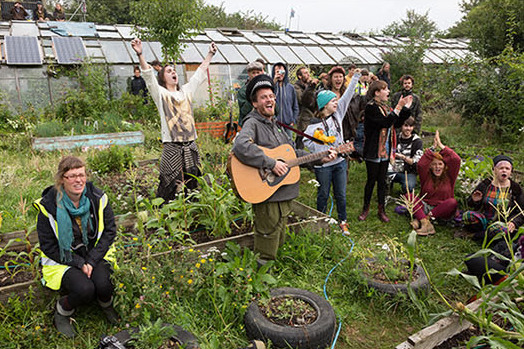
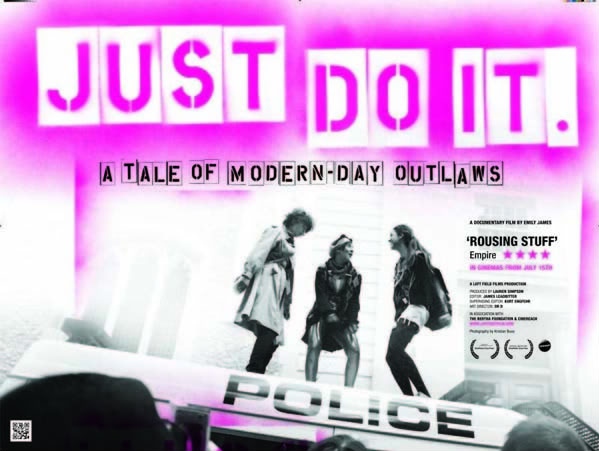
by Shaun Chamberlin | Jun 15, 2011 | All Posts, Climate Change, Cultural stories, Favourite posts, Philosophy, Transition Movement
Last night I went to the première screening of an excellent new film called Just Do It. It's a record of the direct action climate movement - Climate Camp, Plane Stupid et al. - made with the full cooperation of the activists, and it's worth checking out, especially if you've never been directly involved yourself.
It is a story of people responding to the threat to their future with courage, determination, humour and camaraderie. It's also a film that I remember existing only as a flyer, asking whether we would like to see a truly independent film developed outside mainstream production models and distributed for free. Hundreds of us donated, and I was keen to see the result.
After the screening, there was a Q&A session with the director, Emily James, but I found myself sitting there with a question in my head that was prompted by the film, but was refusing to form itself into anything concise and coherent. It was connected with that dreaded thought that everyone involved with any form of heartfelt climate action knows only too well - but what if it's all too late?
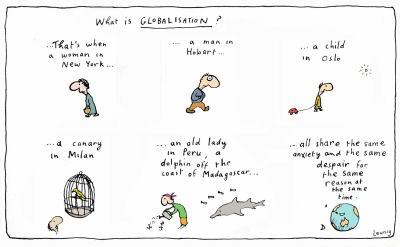 Let me explain. The footage in the film is from 2009 - the buildup to the Copenhagen climate conference in December of that year. It briefly reminds its audience of all the climate science that was marshalled back then to make clear that this was our last hope at curbing emissions to prevent the climate system hurtling off into unstoppable destabilisation. And then, of course, it reminds us of the abject failure this grand conference produced...
One of the most affecting moments in the film was the close-up on one inspiring activist's face as she is asked "but does all this actually achieve anything?" She searches her mind, begins to speak, hesitates, starts again, and stops. Then her eyes seem to look into her heart and soul, and maybe even to shy away from some of the things they see there, before, as I remember, she settles upon "well, it's better than doing nothing".
To me, it was a sad moment, and a question that seemed unresolved, even as the film ended by reminding us that the Heathrow runway expansion has been cancelled, that the Kingsnorth coal power plant plans have been scrapped, and that projects like the exciting Transition Heathrow are growing up where only tarmac and fumes would otherwise have been.
Let me explain. The footage in the film is from 2009 - the buildup to the Copenhagen climate conference in December of that year. It briefly reminds its audience of all the climate science that was marshalled back then to make clear that this was our last hope at curbing emissions to prevent the climate system hurtling off into unstoppable destabilisation. And then, of course, it reminds us of the abject failure this grand conference produced...
One of the most affecting moments in the film was the close-up on one inspiring activist's face as she is asked "but does all this actually achieve anything?" She searches her mind, begins to speak, hesitates, starts again, and stops. Then her eyes seem to look into her heart and soul, and maybe even to shy away from some of the things they see there, before, as I remember, she settles upon "well, it's better than doing nothing".
To me, it was a sad moment, and a question that seemed unresolved, even as the film ended by reminding us that the Heathrow runway expansion has been cancelled, that the Kingsnorth coal power plant plans have been scrapped, and that projects like the exciting Transition Heathrow are growing up where only tarmac and fumes would otherwise have been.
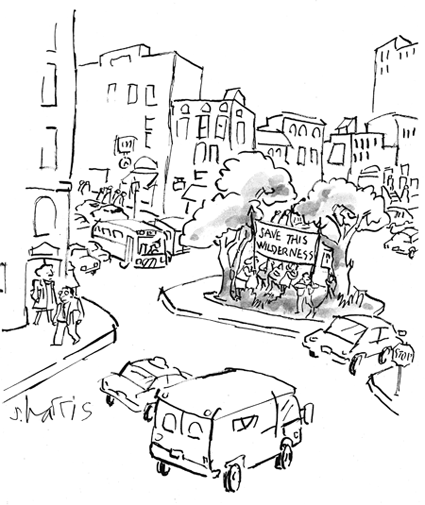 As the deserved applause rang to the credits, I tried to figure out how to formulate this sadness into a question. Eventually, as the Q&A session moved towards its end, I gave up on producing any pithy question, but resolved nonetheless to share the journey I had personally been taken on by watching the film.
And as I spoke, I realised that there is a better answer to that question – does all this actually achieve anything? – than the one spoken in the film. It is the one that is lived by the people portrayed in it.
As my mess of a question/journey/statement tumbled out, and this realisation took form, I found myself ending with a quote from Paul Wellstone, “If we don’t fight hard enough for the things we stand for, at some point we have to recognise that we don’t really stand for them.”
This seemed to ring true, with Emily James responding that she was glad that this question had been asked, and that that quote reflected her experience - that even if we were to lose our struggle for a future, we would want to have lived our present honestly as who we are. In my imagination, it seemed as though she were saying that we sometimes have to put our bodies on the line to save our souls.
As the deserved applause rang to the credits, I tried to figure out how to formulate this sadness into a question. Eventually, as the Q&A session moved towards its end, I gave up on producing any pithy question, but resolved nonetheless to share the journey I had personally been taken on by watching the film.
And as I spoke, I realised that there is a better answer to that question – does all this actually achieve anything? – than the one spoken in the film. It is the one that is lived by the people portrayed in it.
As my mess of a question/journey/statement tumbled out, and this realisation took form, I found myself ending with a quote from Paul Wellstone, “If we don’t fight hard enough for the things we stand for, at some point we have to recognise that we don’t really stand for them.”
This seemed to ring true, with Emily James responding that she was glad that this question had been asked, and that that quote reflected her experience - that even if we were to lose our struggle for a future, we would want to have lived our present honestly as who we are. In my imagination, it seemed as though she were saying that we sometimes have to put our bodies on the line to save our souls.
 The next question from the audience was a response to this, and a simple and interesting one - "so is activism therapy then?". The response from Emily was an enthusiastic "yes", and an explanation of how the process has helped many people to rediscover themselves and their joy in life, and of what an exceptionally supportive community there is among activists.
But I felt that this perhaps wasn't the most interesting thrust behind the question. To me the question hit home more as "so is activism only therapy then"? In other words, are you activists only pretending to be doing this to change the world, when really you're just trying to make yourselves feel better about the understanding that you can't?
And to this, as to all the best questions, the answer seems to be "er, yes and no. It's a bit more complicated than that"!
Because of course we act in order to change the world. And change it we do. Indeed, as a friend says, we cannot not change the world, whatever any of us choose to do. And as we change it, it changes us. And as it changes us, we change it. We are all activists.
And if the story we tell with these changes is one that we are proud to be telling, to the very core of our being, then activism is certainly therapeutic. But that kind of activism is not 'only therapeutic', it is spiritual. It is simply an expression of what we believe life to be for.
The next question from the audience was a response to this, and a simple and interesting one - "so is activism therapy then?". The response from Emily was an enthusiastic "yes", and an explanation of how the process has helped many people to rediscover themselves and their joy in life, and of what an exceptionally supportive community there is among activists.
But I felt that this perhaps wasn't the most interesting thrust behind the question. To me the question hit home more as "so is activism only therapy then"? In other words, are you activists only pretending to be doing this to change the world, when really you're just trying to make yourselves feel better about the understanding that you can't?
And to this, as to all the best questions, the answer seems to be "er, yes and no. It's a bit more complicated than that"!
Because of course we act in order to change the world. And change it we do. Indeed, as a friend says, we cannot not change the world, whatever any of us choose to do. And as we change it, it changes us. And as it changes us, we change it. We are all activists.
And if the story we tell with these changes is one that we are proud to be telling, to the very core of our being, then activism is certainly therapeutic. But that kind of activism is not 'only therapeutic', it is spiritual. It is simply an expression of what we believe life to be for.
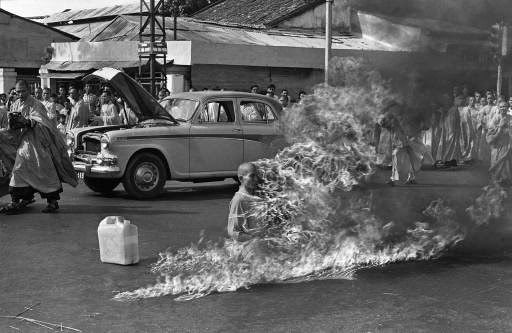 So the thought-provoking activist in the film was right - acting in some way to reflect our beliefs in our actions is indeed better than quietly dying inside, no matter what the external consequences. Perhaps Wendell Berry said it best,
So the thought-provoking activist in the film was right - acting in some way to reflect our beliefs in our actions is indeed better than quietly dying inside, no matter what the external consequences. Perhaps Wendell Berry said it best,
“Protest that endures, I think, is moved by a hope far more modest than that of public success, namely, the hope of preserving qualities in one's own heart and spirit that would be destroyed by acquiescence.”
But this is different from those times when activism is based on a lie - when acting is simply easier than admitting that you don't really believe that these actions can create the change you want to see. This kind of activism probably deserves to be challenged as 'only therapy', and a dangerous, deceitful kind of therapy at that.
...And of course there's only one reason why that audience question struck a painful chord for me, and prompted this rare blog post. It's because I've indulged in a bit of that in my time - ignoring the quiet inner voice that whispers the truth, telling me that the course I have chosen is futile, or counter-productive, or simply no longer a reflection of my highest truth. As Vanessa Spedding has it,
“It would be interesting if all campaigners did this: stopped, went home, and considered what we are really doing with our time and our ideas. Striving to be true to ourselves would seem to be a sensible first goal.”
This is exactly what I am trying to do at present, hence the lack of speaking, writing etc of late. I am very much in a listening phase, rather than a speaking one, and that feels very right. After last night's interesting excursion, I have just ordered a copy of the provocative Deep Green Resistance, and will also be keeping an eye on the blog of one lady who is trying to find something more effective altogether than resistance. I will let you know how we get on.
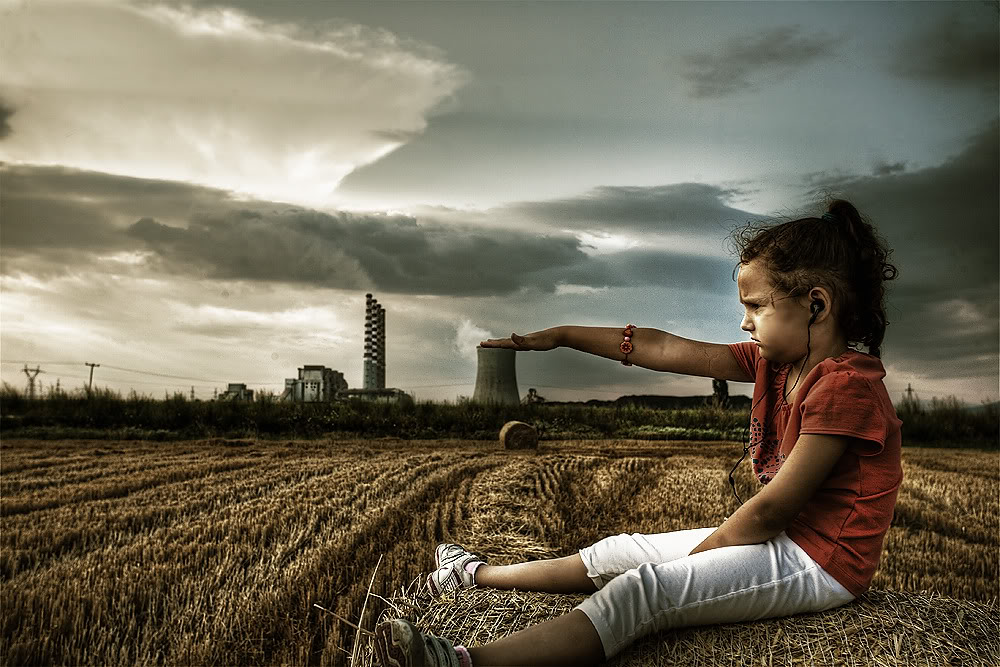
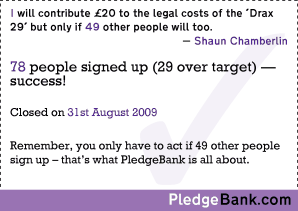
by Shaun Chamberlin | Jul 3, 2009 | All Posts, Climate Change, Cultural stories, Favourite posts, Philosophy, Politics
A week after NASA's leading climate scientist Dr. James Hansen, actress Darryl Hannah and others crossed the line into illegal direct action in a desperate attempt to prevent coal mining and burning from ending our hopes of retaining a hospitable climate, twenty-nine protesters are standing trial here in England for a similar action last year.
The 'Drax 29' admit stopping (safely) a coal train two miles outside the Drax power station in an attempt to prevent the deaths already being caused by climate change. Nonetheless they have entered a "Not Guilty" plea against the charge of 'Obstructing the Railway' (which carries a maximum two year prison sentence). They are defending themselves in court, and after reading their inspiring closing statement justifying this position to the jury, I felt moved to create the pledge above. You can read their defence yourself in The Guardian here, or it is reproduced in full below:
--
Members of the jury.
I'm going to try to summarise why we feel that we are not guilty, why we feel that what we did was right, despite the very proper laws against obstructing trains, why we feel that it was the wrong decision of the Crown Prosecution Service to prosecute us in this case, and why we don't feel that we are guilty of a crime.
I want to start by responding to your request for clarification yesterday about "lawful excuse". His honour may say [in his summing up] that it's true that there are ways in law to make space for circumstances, to allow a bigger picture to be considered.
These ways can have different names for different offences — so for example "lawful excuse", which you asked about yesterday, applies only to the charge of criminal damage. For example, last September, a jury in Kent found six protesters not guilty of committing £30,000 worth of criminal damage to Kingsnorth coal-fired power station, since the group were acting to prevent a greater crime. Those on trial did not disagree that criminal damage is a crime, just that, in certain circumstances, it may be necessary and proportionate to cause some damage to prevent a great crime. That jury agreed.
His honour may explain that there is a legal defence of "necessity", that applies to most laws, and that it was on the basis of "necessity" — the fact that we believed our actions were going to save lives and that we had to act — that we prepared a legal defence before this trial. Along with many legal professionals we were very disappointed by his honour's decision prior to the trial that this defence was not available to us in law. Nonetheless we decided not to appeal against it. We felt that you the jury would be free to decide on the facts of a case as you find them - and not just the ones his honour tells you are relevant.
It's up to you to decide whether what we did was necessary. I would like to emphasise to you that we believed and we still believe that it was urgently necessary to do what we did, and proportionate to the scale of the problem, that the consequences of that train taking coal into Drax are so serious that any reasonable person would understand our reasons for stopping it. To help explain why we were so sure of the links between Drax's activities and deaths around the world we had expert witnesses lined up to talk to you about the immediate and ongoing harm that Drax's emissions cause. However from what evidence we have been able to get across to you, with his honour's indulgence, we hope that you can see that these facts speak for themselves, and our actions, though harmful, were indeed necessary to try to stop a greater harm. And if you agree with that then you still have a legal right – as the jury - to find us not guilty.
You've heard it said already I think, that the judge decides about the law, but the jury decide about the facts. What does that mean? It means you the jury can decide as you see fit. You the jury have a constitutional right to follow your own judgement and not necessarily follow the judge's directions to find us guilty. In other words, you get to make the final decision. In law this principle is called the jury's power of nullification, and it's been a right that has been regularly used over the years when juries have felt the law has been applied harshly, or inappropriately, or unjustly, or incorrectly.
Perhaps I can explain this with a quote from a very senior judge, Lord Denning. He said:
"This principle was established as long ago as 1670 in a celebrated case of the Quakers, William Penn and William Mead. All that they had done was to preach in London on a Sunday afternoon. They were charged with causing an unlawful and tumultuous assembly there. The judge directed the jury to find the Quakers guilty, but they refused. The Jury said Penn was guilty of preaching, but not of unlawful assembly. The Judge refused to accept this verdict. He threatened them with all sorts of pains and punishments. He kept them 'all night without meat, drink, fire, or other accommodation: they had not so much as a chamber pot, though desired'. They still refused to find the Quakers guilty of an unlawful assembly. He kept them another night and still they refused. He then commanded each to answer to his name and give his verdict separately. Each gave his verdict 'Not Guilty'. For this the judge fined them 40 marks apiece and cast them into prison until it was paid. One of them Edward Bushell, thereupon brought his (case) before the Court of the King's Bench. It was there held that no judge had any right to imprison a juryman for finding against his direction on a point of law; for the judge could never direct what the law was without knowing the facts, and of the facts the jury were the sole judge. The jury were thereupon set free."
This was affirmed as recently as 2005, in relation to the case of Wang, where a committee of Law Lords in the highest court in the land, the House of Lords, concluded that: "there are no circumstances in which a judge is entitled to direct a jury to return a verdict of guilty". So you do have that right to decide for yourselves. And unlike in 1670, his honour won't be able to fine you, or put you in prison for making what he sees as the wrong decision.
There have been many cases over the years where juries have decided, on reflecting more broadly, to find people not guilty despite directions from the judge. For example, the case of Zelter and others who were accused of damage to an aircraft about to be used for bombing civilians. In all of these and others the judge said that the defendants admitted the offence and so must be found guilty. But the jury chose to look outside the limited view of the court room, and to find them not guilty.
The freedom that you have is what enables the law, where necessary, to move forward. It is what allows you to look beyond the confines of this court to the wider world, and to make a judgement based not just on law, but to make a judgement based on justice. Justice is the force that underpins and breathes life into the law, and it is your role as the jury to see that justice as you see it is done.
We all know that times change, and what was acceptable in one era may not be acceptable in another. You have heard of how it was once legal to own other people, how it was illegal for women to vote. Well one way or another we are going to have to stop burning coal and move on from the fossil fuel era. And that means that the law will eventually have to change and acknowledge the harm that carbon emissions do to all of us, by making them illegal. The only question is whether the law will catch up in time for there to be anything left to protect.
We are not trying to tell you how to decide. We are only trying to say that it is up to you, and we are grateful for that.
I want you to think back to that situation of there being a person on the tracks ahead of that train going on its way to Drax. Members of the Jury, it may sound like a strange thing to say but in truth there is a person on the branch line to Drax. The prosecution have not challenged the facts we presented to you on oath about the consequences of burning coal at Drax. 180 human lives lost every year, species lost forever. There is a direct, unequivocal, proven link between the emissions of carbon dioxide at this power station and the appalling consequences of climate change. That many of those consequences impact on the poor of other nations or people in Hull we don't know and should not in any way negate the reality of this suffering. We got on that train to stop those emissions, because all other methods in our democracy were failing. Just because we don't know the name of the person on the tracks or where they live or the exact time and day of their dying, does not in our view mean they are less worthy of protection.
We don't dispute that there's a law against obstructing trains. We don't dispute that obstructing trains is a crime and should continue to be a crime. We just argue that in this case, we should not be found guilty of a crime for trying to block this train on its way to Drax.
On Tuesday the prosecution argued that what we did was quite simply a crime, and as a result we should be found guilty. They were trying to suggest that if you find us not guilty, the whole world would fall apart. We argue that the more likely route to the whole world falling apart is if we continue burning coal in the enormous quantities that it is being burnt at Drax.
His honour may say that we have been telling you stories, that we are trying to introduce emotions into the trial to distort the evidence. But we have been telling you the facts. If those facts move you, that's because they are moving, and they are what moved us to do what we did.
We are happy to be judged by you, the jury.
Thank you for taking the time to listen to us.
--
See full details of the pledge I have created in support of the Drax 29 - and the option to sign - by clicking the image below.

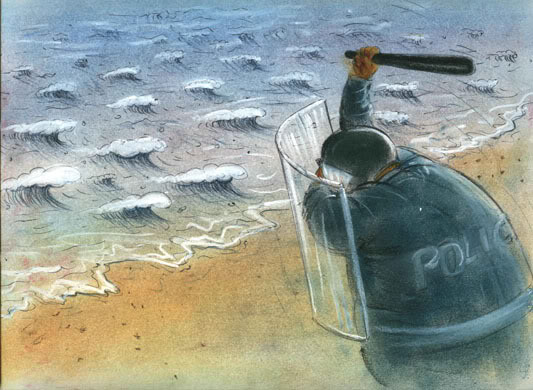
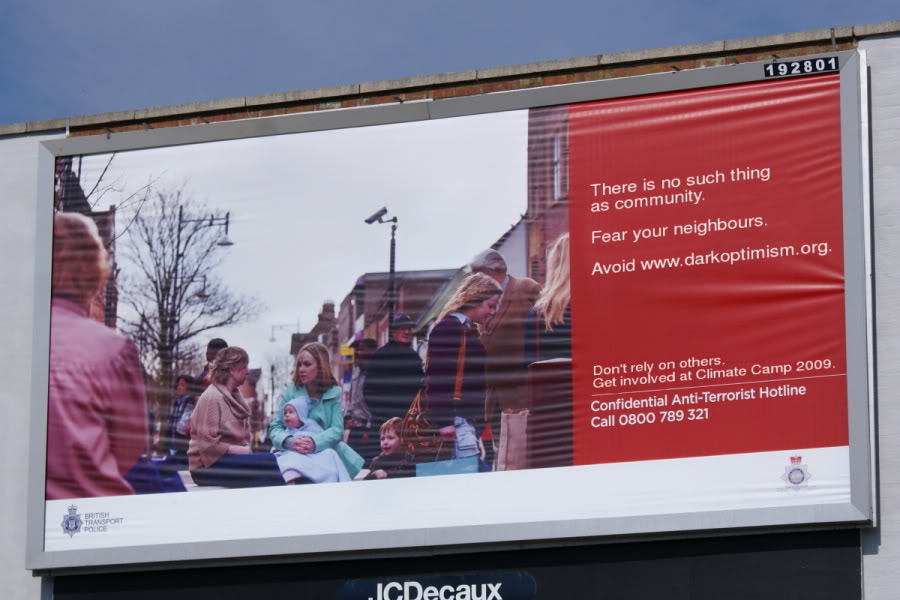
by Shaun Chamberlin | Jun 29, 2009 | All Posts, Climate Change, Cultural stories
This year's Climate Camp will run from Thurs 27th August to Weds 2nd Sept, at an as yet undeclared location in or around London (inside the M25).
This year the camp will not be culminating in a 'direct action', but will instead be focusing on movement-building and skill-sharing. I'm helping to organise the workshop programme, and would encourage all Dark Optimism readers to consider offering a talk/workshop/debate, by following this link. The deadline has now been extended, but if you're interested then the sooner you can submit details the better.
The camp's location in London is designed to highlight the links between the economy and the climate crisis, so workshops in this area are particularly welcome, but any relevant themes or issues will be warmly received. I'll be discussing the relationship between the Transition movement and direct action. Anyone can apply, workshops can be delivered by individuals or groups, and you don’t have to be an expert to give a workshop.
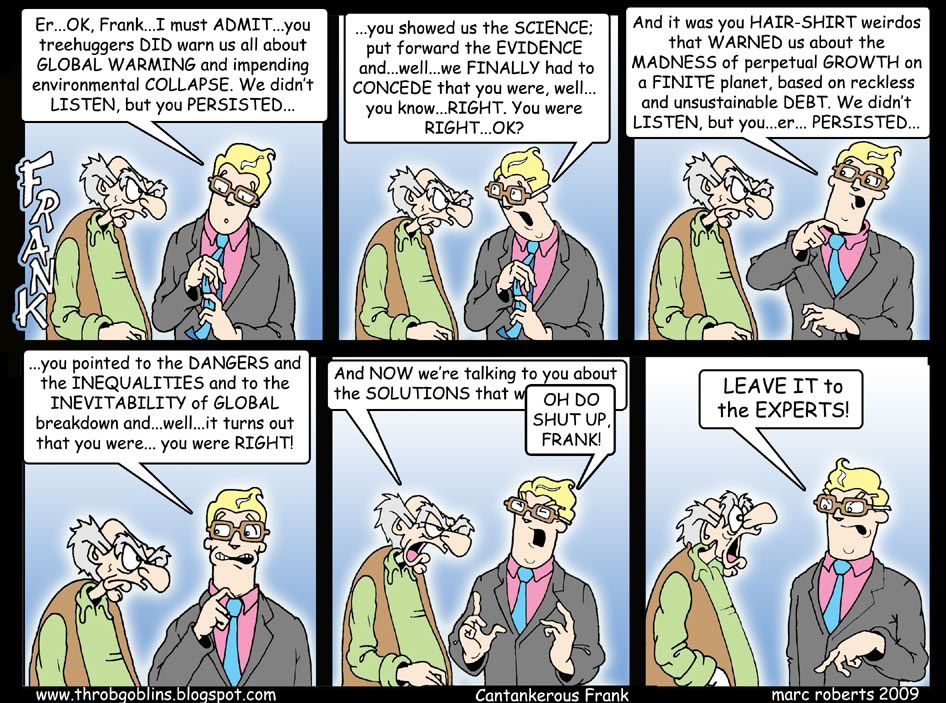 Alternatively, if there is a workshop you would really like to see take place at this year’s Camp, but you don't want to run it yourself, then please email us via workshops@climatecamp.org.uk with 'workshop suggestion' in the subject line. If you can suggest a suitable person or group to do the workshop, then even better.
If you are not based in England, Climate Camps will also be taking place this summer in Scotland (3rd - 10th August), Wales (13th - 16th August) and around the world.
--
ps If you too would like to make your own versions of those rather troubling police posters around - "you have the right not to remain silent", "don't understand your neighbour's rubbish? tell the police" etc - James Holden has made it wonderfully easy!
I'd also be interested to know how widespread these red posters are - is it just a London thing, or are they right across Britain?
Alternatively, if there is a workshop you would really like to see take place at this year’s Camp, but you don't want to run it yourself, then please email us via workshops@climatecamp.org.uk with 'workshop suggestion' in the subject line. If you can suggest a suitable person or group to do the workshop, then even better.
If you are not based in England, Climate Camps will also be taking place this summer in Scotland (3rd - 10th August), Wales (13th - 16th August) and around the world.
--
ps If you too would like to make your own versions of those rather troubling police posters around - "you have the right not to remain silent", "don't understand your neighbour's rubbish? tell the police" etc - James Holden has made it wonderfully easy!
I'd also be interested to know how widespread these red posters are - is it just a London thing, or are they right across Britain?
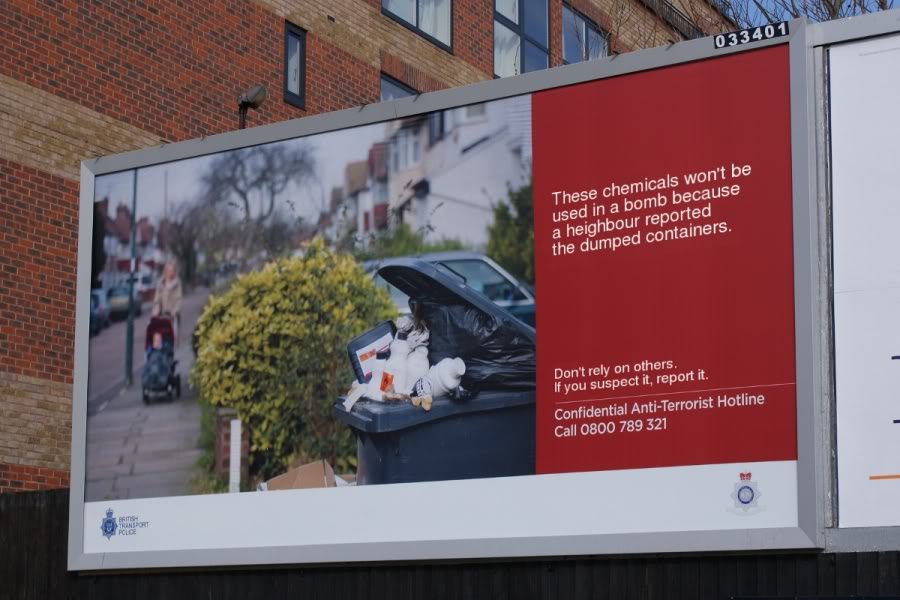

 This new piece in the Carbon Management journal has emerged from all of that as the definitive paper on TEQs, covering its design, history and importance, and directly contrasting its hard cap on emissions with the ‘carbon pricing’ approach that has undermined public engagement with, and support for, climate policy.
I have written before about the shortcomings of global-scale action on global-scale problems, but local-scale action has its inherent problems too. Without a supportive economic/political framework in place, it is always swimming against the tide, and this can be exhausting and disheartening. As explained in the paper, TEQs provides the key framework to join up local and global scale efforts into an effective solution, making it clear to everyone - across all sectors - how to act on our intrinsic shared desires to sustain affordable access to energy and preserve a benign climate (see section on "Integration – cross-sector engagement, motivation and collaboration", pp. 8-10).
Not to mention leading to support and investment for human-scale, community-level initiatives and enterprises and local economies, making for more integrated, happier, resilient communities and a stronger sense of common purpose across society. I really believe that TEQs could catalyse a turning point towards a happier world and, more importantly, the extensive research done to date backs that up. Also, as discussed in the paper, unlike many other beautiful ideas, it actually has a hope of being implemented!
Rather than seeing our most committed people channelled into building inherently flawed 'carbon pricing' mechanisms, let's focus our energies on something genuinely radical that creates a fairer, more equitable world, and which enjoys greater public support.
I look forward to hearing what you make of our work, in the comments below or elsewhere.
~ UPDATE - This was my first venture into scientific academic writing (and likely last, after such an arduous process!), but I strove to ensure that academic-speak was kept to a minimum, and that the message is clear.
So it is gratifying to see that only a month after publication it is already in the Top 10 most-read pieces that have been published in the Carbon Management journal and, according to Altmetric, in the top 5% most discussed articles among the 4 million or so that they track! That said, it will have to have one hell of an impact to tempt me into academia ever again ;) ~
~ SECOND UPDATE - 23rd Sept 2015 - Tom Burke has published an exceptional blog post giving far more insight into the devious motivations of Big Oil in promoting carbon pricing.
And in the meantime, our paper has become the most read in the history of the Carbon Management journal, and in the top 3% most discussed on Altmetric. Despite Big Oil's best efforts, word's getting out... ~
In the meantime, I have been 'offsetting' the pain of academic writing by indulging in some deeply nourishing artivist agnosticism with Reverend Billy and his glorious Stop Shopping Choir (spot me flyering around the 1m30 mark).
A little analysis and deep thinking is important - after all “action for action's sake is the last resort of mentally and morally exhausted men” - but too much makes Jack a dull boy... I must confess, I'm rather tempted to run away and join the church. My mother would be truly horrified!
I'll have to content myself with heading to the Reclaim The Power direct action camp this weekend :) See you there?
This new piece in the Carbon Management journal has emerged from all of that as the definitive paper on TEQs, covering its design, history and importance, and directly contrasting its hard cap on emissions with the ‘carbon pricing’ approach that has undermined public engagement with, and support for, climate policy.
I have written before about the shortcomings of global-scale action on global-scale problems, but local-scale action has its inherent problems too. Without a supportive economic/political framework in place, it is always swimming against the tide, and this can be exhausting and disheartening. As explained in the paper, TEQs provides the key framework to join up local and global scale efforts into an effective solution, making it clear to everyone - across all sectors - how to act on our intrinsic shared desires to sustain affordable access to energy and preserve a benign climate (see section on "Integration – cross-sector engagement, motivation and collaboration", pp. 8-10).
Not to mention leading to support and investment for human-scale, community-level initiatives and enterprises and local economies, making for more integrated, happier, resilient communities and a stronger sense of common purpose across society. I really believe that TEQs could catalyse a turning point towards a happier world and, more importantly, the extensive research done to date backs that up. Also, as discussed in the paper, unlike many other beautiful ideas, it actually has a hope of being implemented!
Rather than seeing our most committed people channelled into building inherently flawed 'carbon pricing' mechanisms, let's focus our energies on something genuinely radical that creates a fairer, more equitable world, and which enjoys greater public support.
I look forward to hearing what you make of our work, in the comments below or elsewhere.
~ UPDATE - This was my first venture into scientific academic writing (and likely last, after such an arduous process!), but I strove to ensure that academic-speak was kept to a minimum, and that the message is clear.
So it is gratifying to see that only a month after publication it is already in the Top 10 most-read pieces that have been published in the Carbon Management journal and, according to Altmetric, in the top 5% most discussed articles among the 4 million or so that they track! That said, it will have to have one hell of an impact to tempt me into academia ever again ;) ~
~ SECOND UPDATE - 23rd Sept 2015 - Tom Burke has published an exceptional blog post giving far more insight into the devious motivations of Big Oil in promoting carbon pricing.
And in the meantime, our paper has become the most read in the history of the Carbon Management journal, and in the top 3% most discussed on Altmetric. Despite Big Oil's best efforts, word's getting out... ~
In the meantime, I have been 'offsetting' the pain of academic writing by indulging in some deeply nourishing artivist agnosticism with Reverend Billy and his glorious Stop Shopping Choir (spot me flyering around the 1m30 mark).
A little analysis and deep thinking is important - after all “action for action's sake is the last resort of mentally and morally exhausted men” - but too much makes Jack a dull boy... I must confess, I'm rather tempted to run away and join the church. My mother would be truly horrified!
I'll have to content myself with heading to the Reclaim The Power direct action camp this weekend :) See you there?





 As the deserved applause rang to the credits, I tried to figure out how to formulate this sadness into a question. Eventually, as the Q&A session moved towards its end, I gave up on producing any pithy question, but resolved nonetheless to share the journey I had personally been taken on by watching the film.
And as I spoke, I realised that there is a better answer to that question – does all this actually achieve anything? – than the one spoken in the film. It is the one that is lived by the people portrayed in it.
As my mess of a question/journey/statement tumbled out, and this realisation took form, I found myself ending with a quote from Paul Wellstone, “If we don’t fight hard enough for the things we stand for, at some point we have to recognise that we don’t really stand for them.”
This seemed to ring true, with Emily James responding that she was glad that this question had been asked, and that that quote reflected her experience - that even if we were to lose our struggle for a future, we would want to have lived our present honestly as who we are. In my imagination, it seemed as though she were saying that we sometimes have to put our bodies on the line to save our souls.
As the deserved applause rang to the credits, I tried to figure out how to formulate this sadness into a question. Eventually, as the Q&A session moved towards its end, I gave up on producing any pithy question, but resolved nonetheless to share the journey I had personally been taken on by watching the film.
And as I spoke, I realised that there is a better answer to that question – does all this actually achieve anything? – than the one spoken in the film. It is the one that is lived by the people portrayed in it.
As my mess of a question/journey/statement tumbled out, and this realisation took form, I found myself ending with a quote from Paul Wellstone, “If we don’t fight hard enough for the things we stand for, at some point we have to recognise that we don’t really stand for them.”
This seemed to ring true, with Emily James responding that she was glad that this question had been asked, and that that quote reflected her experience - that even if we were to lose our struggle for a future, we would want to have lived our present honestly as who we are. In my imagination, it seemed as though she were saying that we sometimes have to put our bodies on the line to save our souls.









Recent Comments